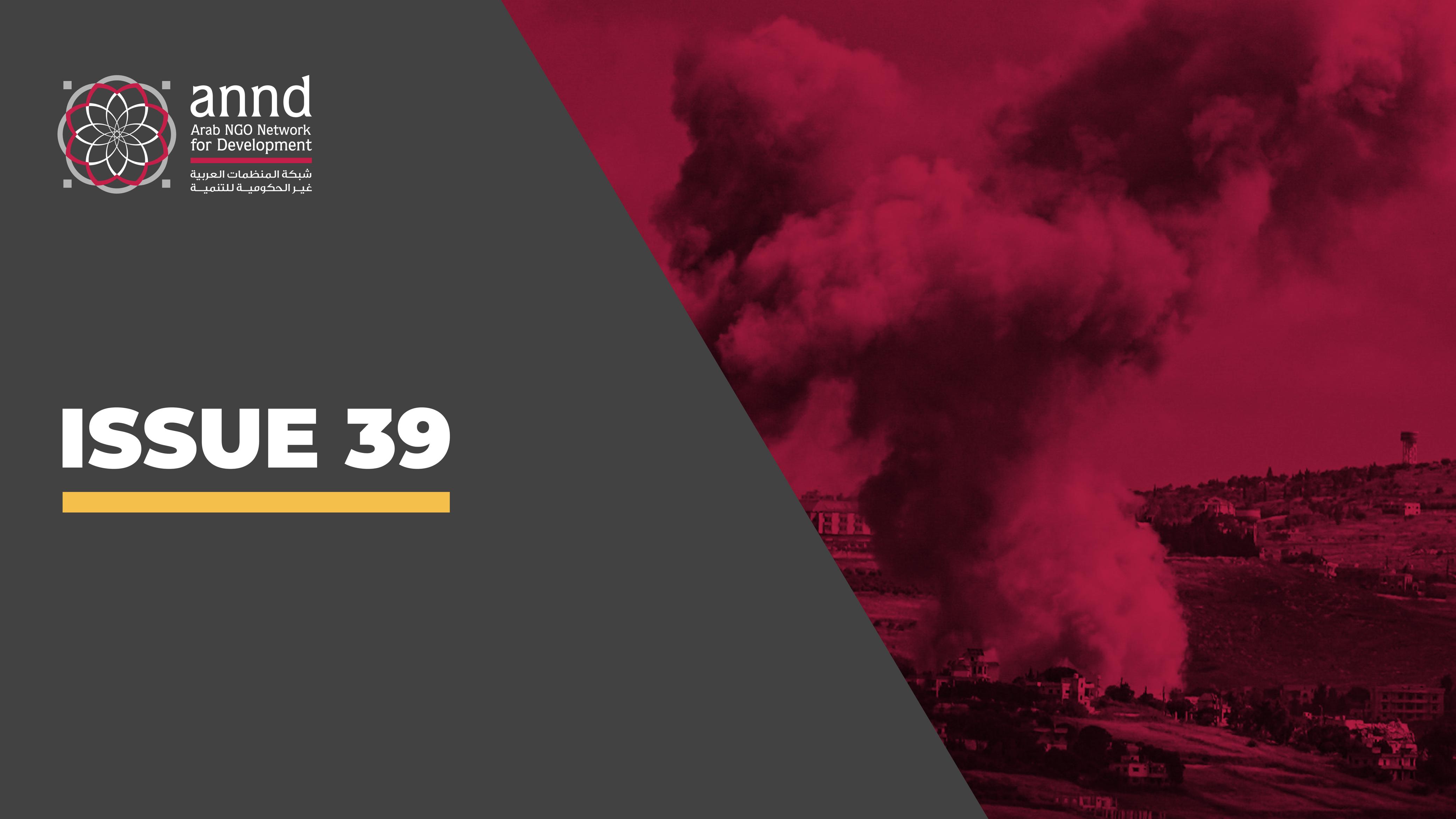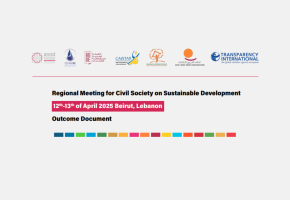
A Region on Fire
Issue 39 - November 4, 2024
Israel documents war crimes in Gaza and Lebanon
After being officially informed of the Israeli decision, the United Nations has repeated its warnings through several officials that Israel's decision to cut ties with UNRWA will have serious impacts on its work in Palestinian territories. Meanwhile, UNRWA continues its work in Gaza despite the decision, amidst major field difficulties due to the Israeli blockade, especially in the northern governorate.
Israel continues its policy of destroying villages in southern Lebanon, publishing aerial images of its actions, which confirms that this is a systematic operation unrelated to responding to attacks on its forces or to any military threat against its soldiers. This extensive demolition makes these acts clear, documented war crimes by Israel itself, bringing them to the attention of the International Court of Justice and the international community.
Gaza: Northern Hospitals Out of Service
UNRWA Commissioner-General Philippe Lazzarini said on Monday that last month, Israel allowed a daily average of 30 humanitarian trucks into Gaza, which is only six per cent of the commercial and humanitarian supplies allowed in before the war. On the social platform X, he commented, “This cannot meet the needs of over two million people, many of whom are hungry, sick, and in desperate conditions."
The UN-supported polio vaccination campaign in Gaza’s besieged north concluded on Monday, vaccinating 94,000 children. However, thousands remain unreachable. Top UN officials expressed concern about reported violence in some sites where parents, children, and aid workers gathered for the campaign. WHO Director-General Tedros Adhanom Ghebreyesus voiced deep worry over weekend reports of attacks on a health center.
The Gaza Health Ministry reported that medical staff at Kamal Adwan Hospital cannot move to aid the injured, noting signs of an intentional targeting of medical personnel who refused evacuation. Continued heavy shelling of Kamal Adwan Hospital has caused injuries among both medical staff and patients.
The Gaza Government Media Office has urged the UN General Assembly to expel Israel from UN agencies, asserting that Israel is now an ostracized entity occupying Palestinian lands. The office held Israel and the U.S. fully accountable for the catastrophic consequences of banning UNRWA. According to the office, hundreds of bodies lie in the streets due to an inability to retrieve them, while tanks and Israeli warships relentlessly shell homes and every spot in northern Gaza.
The Gaza Health Ministry reported that 33 people were killed and 156 injured in three Israeli massacres over the past 24 hours, bringing the death toll from the Israeli assault to 43,374 and the number of injured to 102,261 since October 7, 2023.
A Third of Gaza's Casualties Are Children
The Israeli war on Gaza has resulted in over 43,000 casualties among Gaza’s residents, with 70% of them being women and children. Infants represent a significant portion of the casualties, as Israeli actions have affected all aspects of life in Gaza.
In a television interview, Mohammed Zaqout, the director of Gaza’s hospitals, stated that around 13,000 children have died since the beginning of the war on Gaza. Zaqout told Al Jazeera that children account for a third of the total casualties, adding, “Many infants and children have also died due to other war-related factors, such as malnutrition and infectious diseases.”
Boycott Campaigns
The British bank, Barclays, has announced its divestment from the Israeli company Elbit Systems, marking a victory for the Boycott, Divestment, and Sanctions (BDS) movement. This decision, made by the bank two days ago, followed a series of protests outside its branches in London, where activists called for British institutions to stop investing in companies that support Israel.
West Bank: Arrests of Palestinian citizens, and settlers attack Al-Bireh
Israeli forces have arrested 20 Palestinians from the West Bank, including a child and several former detainees. According to a joint statement from the Palestinian Prisoner’s Society and the Commission of Detainees and Ex-Detainees Affairs, the arrests occurred across the governorates of Hebron, Nablus, Bethlehem, Ramallah, and Qalqilya. The statement noted that during these raids, Israeli forces subjected detainees and their families to physical assaults, threats, and extensive property damage in their homes. It also reported that since the onset of the ongoing military campaign on October 7 of last year, over 11,600 Palestinians from the West Bank, including East Jerusalem, have been detained.
On Monday, settlers set fire to several Palestinian vehicles in Al-Bireh, a city in the central West Bank. During the past October alone, Israeli forces and settlers carried out 1,490 assaults across various areas in the occupied West Bank, according to the Palestinian Wall and Settlement Resistance Commission. These attacks included armed assaults on Palestinian villages, extrajudicial killings, property destruction, land clearing, tree uprooting, property seizures, and the establishment of roadblocks and checkpoints.
Negotiations Between Fatah and Hamas in Egypt
Negotiations between the Fatah and Hamas movements in Cairo have stalled over the administration of the Gaza Strip following the war. Egypt proposed the formation of a "Civil Support Committee" made up of independent figures, which would manage the sector, oversee reconstruction, and supervise the Rafah border crossing. However, the Palestinian Authority (PA) opposes the idea of an independent committee, insisting it should operate under the supervision of the Palestine Liberation Organization (PLO), a condition Hamas rejects. Meanwhile, Israel opposes any role for Hamas in Gaza after the war and has also expressed a lack of confidence in the PA under Abbas’s leadership to manage the area.
International Positions on Developments in Gaza and the West Bank
Egyptian President Abdel Fattah al-Sisi met with Palestinian President Mahmoud Abbas, affirming Egypt's support for the Palestinian cause and rejecting all forms of Israeli escalation against Palestinians in Gaza and the West Bank. Al-Sisi reiterated Egypt’s commitment to intensive efforts aimed at de-escalation, achieving a ceasefire, delivering humanitarian aid, and supporting the legitimate right of the Palestinian people to establish an independent state along the June 4, 1967 border lines in accordance with international resolutions.
Hamas leader Osama Hamdan condemned settler attacks in the West Bank, such as the recent incident in Al-Bireh, as serious escalations that require immediate response. He also remarked that regardless of the outcome of the U.S. elections, it will not affect Palestinians, as both parties support aggression against the Palestinian people and cause.
Jordan's King Abdullah II called on the international community to oppose Israel’s "escalatory measures" against the UN Relief and Works Agency for Palestine Refugees (UNRWA). The Jordanian Foreign Ministry condemned the violence and terrorism perpetrated by settlers in the West Bank, including the recent burning of cars in Al-Bireh.
UNRWA warned that Israel's ban on its operations could lead to a "collapse of humanitarian work" in Gaza. The Swedish Foreign Minister called for a ceasefire in Gaza, respect for international law, and the provision of humanitarian aid.
Malaysia’s Prime Minister announced that his country is preparing a resolution to expel Israel from the United Nations if it continues violating international law in Palestine. Turkish President Recep Tayyip Erdogan described the events in Gaza as one of the most brutal acts of genocide and one of the most severe tests faced by the Islamic world.
Syria
Two members of Hezbollah were killed and 5 others were seriously injured as a result of Israeli strikes on a farm in the Sayyida Zainab area in the countryside of Damascus.
Israel launched three strikes targeting three separate farms in the south and southeast of Sayyida Zainab in the “Rif Dimashq” Governorate. According to sources from the Syrian Observatory, one of the targeted farms had previously been used as rest areas and camps by the Iranian Revolutionary Guard and Hezbollah.
Battlefield Developments in Lebanon
Israeli aircraft continued to bombard southern Lebanon and the Beqaa Valley, launching a series of airstrikes targeting most towns and villages in the southern region. Israeli media released footage showing the complete destruction of neighborhoods in the town of Mays al-Jabal, southern Lebanon, occurring in less than 30 seconds. The Israeli army is continuing to demolish entire border towns in the south, claiming they are centers for Hezbollah and sites for launching attacks.
The Israeli military announced that nine soldiers were injured in battles in southern Lebanon in the past 24 hours. Meanwhile, Hezbollah stated that it had targeted several Israeli settlements and military sites in northern Israel as part of a warning issued to a number of northern settlements. Israeli Channel 12 reported that approximately 60 rockets and four drones were launched from Lebanon towards the north, with some coming from Lebanon and others from the east.
According to the Ministry of Health, Israeli airstrikes on Sunday, November 3, 2024, resulted in 16 martyrs and 90 injuries. The total number of martyrs and injuries since the start of the aggression has reached 3,002 martyrs and 13,492 injuries.
In the last 48 hours, 153 airstrikes and shelling incidents were recorded across various areas of Lebanon, primarily concentrated in Nabatieh and the south, bringing the total number of attacks since the beginning of the aggression to 12,029.
The Ministry of Public Health released casualty figures from the last 48 hours, reporting 34 martyrs and 173 injuries, bringing the total since the start of the aggression to 3,002 martyrs and 13,492 injuries.
A total of 1,135 accredited centers have been opened to shelter and receive displaced persons, with 967 centers reaching their maximum capacity. The total number of registered displaced individuals has reached 191,823 in accredited shelters, comprising 44,639 families.
From September 23 to November 4, 2024, the General Security recorded the crossing of 364,540 Syrian citizens and 184,942 Lebanese citizens into Syrian territory.
Political Developments in Lebanon
Lebanese Prime Minister Najib Mikati handed the ambassadors of the five permanent members of the UN Security Council a report issued by the Ministry of Health on the damage caused to the health sector by Israeli raids, in addition to a letter in which he stressed that the ongoing Israeli aggression, especially the attacks on cities such as Baalbek and Tyre, have led to the displacement of entire villages and threaten priceless heritage and cultural sites. Mikati called on "the Security Council to take swift and decisive measures to protect these historical treasures." He stressed in a statement that "the Lebanese government has explicitly declared its commitment to Resolution 1701, and its determination to strengthen the army in the south, and welcomed all positions calling for a ceasefire, but Israel has turned against all proposed solutions and continued to commit war crimes against various Lebanese regions, even targeting archaeological sites."
The European Union Ambassador, Sandra de Waal, announced the European Union's support after meeting with the Prime Minister and the Minister of Foreign Affairs and Emigrants, and stressed the need for an immediate ceasefire. She explained the various means of supporting Lebanon through humanitarian aid, financial, humanitarian, and political support. She touched on the issue of education and the need to provide education for all children in Lebanon. De Waal noted that "the importance of reforms was discussed during the meeting, and since the reconstruction process could begin sooner or later, it requires a well-functioning banking sector, along with reforms and combating corruption."
Lebanese Minister of Public Health Dr. Firas Abiad sent a message to the international community, which is witnessing the Israeli attacks targeting the medical staff and violating international laws, asking it to assume its responsibilities to protect health facilities and their workers.
Interior Minister Bassam Mawlawi announced that "what happened in Batroun, northern Lebanon (the landing of the Israeli commando unit and the kidnapping of the Lebanese youth under the pretext that he is a member of Hezbollah) is a violation and an act of war, and there is an ongoing investigation by the Lebanese army." He stressed that "attacks on public and private property are prohibited, and the Internal Security Forces will remove the encroachments on the remaining private property while ensuring the dignity of the displaced."
Humanitarian Response in Lebanon
The head of the emergency committee, Minister of Environment Nasser Yassin, announced that the humanitarian and food aid received so far amounts to 10,000 tons and is distributed through international organizations or associations. He stated that the ministerial committee receives assistance from friendly Arab countries, which is distributed through the governors. He also confirmed that the $800 million approved at the Paris conference to support Lebanon is still just commitments and has not yet arrived.
Minister of Public Health Dr. Firas Al-Abyad announced the opening of new departments at the Turkish Specialized Hospital for Injury and Burn treatment in Sidon.
The "King Salman Center for Relief and Humanitarian Action" stated in a statement that it continues to distribute humanitarian aid to families displaced from the southern governorate and Beirut, with aid distributed in the Eqlim al-Khroub and Beirut areas. Today’s aid benefited approximately 295 displaced families, helping over 1,500 individuals.
The Qatari foreign ministry announced that a Qatari plane arrived in Beirut carrying assistance to support the Lebanese people.
International Developments
The Pentagon announced the reinforcement of U.S. forces in the region, sending warplanes along with B-52 strategic bombers accompanied by refueling aircraft from bases in Europe and the United States.
The French ambassador to Lebanon, Hervé Magro, stated that they have worked with the US to try to establish a ceasefire since last October. He noted that Hochstein's visit was inconclusive but necessary, and we must continue our efforts to achieve a ceasefire and advance negotiations. He added that there is progress in the negotiations because we are discussing specific conditions today. He continued that the discussion is led directly with the government. He added that even if they have relationships with many parties, the priority is for the Lebanese government, and the war has not prevented communication and contacts with Hezbollah.
Israeli media reported that “significant progress” has been made in negotiations between Israel and Lebanon, suggesting that an agreement could be reached within two weeks. Reports from Channels 12 and 13 and the Israeli Broadcasting Authority indicated that any attack by Iran on Israel “will not affect” the ongoing discussions aimed at reaching a settlement regarding the Lebanese issue.
The Egyptian foreign ministry announced that Minister Abdel-Aty emphasized in a call with his Iranian counterpart the need to prevent escalation in the region and achieve de-escalation while being cautious about dragging the area into a regional war.
Haaretz newspaper reported that security information leaked from Prime Minister Benjamin Netanyahu’s office was manipulated to distort certain details to influence public opinion in Israel, highlighting the seriousness of the leaks due to the use of sensitive information that could jeopardize intelligence sources.
Iranian President Masoud Pezeshkian stated that Iran is facing a comprehensive economic war and is not afraid of military conflict, asserting that Israel cannot stop it. He claimed that Iran's missiles are not intended to attack any country but to defend itself, while warning against any attacks on Iran. He added that the people of Gaza remain steadfast with dignity and greatness, and Israel has not succeeded in forcing them to surrender after a year.
The deputy commander of the Iranian Revolutionary Guard, Major General Ali Fadavi, stated that Iran would respond to attacks from Israel, adding that he could not disclose details of the response, but the attack “will definitely be carried out,” according to the state-affiliated news agency Tasnim.
Recent publications

ANND Newsletter - March Issue: Financing for Development: Between Transparency and Global Challenges
